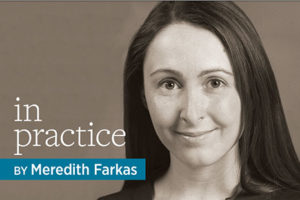
As a child, I received many diaries as gifts—the cute ones from the 1980s that included a tiny lock and key. I’d write in them for a few days or maybe even a few weeks, but I was never able to build a habit of writing about my life, primarily because I couldn’t understand the purpose. I’m now in awe of friends who captured decades of memories in books.
I’ve similarly struggled to develop a regular practice of reflecting on my work, though I can now see why it’s so valuable. Reflective practice is the act of looking back on what you did so that you can learn from it and inform what you do in the future. Many of us do this informally in our day-to-day work. When we have a bad interaction at the reference desk, we think about how we can keep it from happening again. It’s how we improve. However, we are often so busy that unless we make reflection a formal part of our work, it’s easy to rush from one task to another without thinking about how we might change.
This means we can continue making the same mistakes. I used to think that being in a service profession meant focusing on others rather than thinking of ourselves. But we bring ourselves to every interaction with patrons. Not examining how the values and assumptions that underlie our thinking influence our actions can keep us from recognizing and changing negative patterns.
Reflective practice can help librarians and other professionals become more culturally competent by uncovering biases and assumptions that influence our interactions with our diverse community members, but only if we are willing to examine the roles power and privilege play in our lives and worldview. Because librarianship is still a rather homogeneous profession, critical reflection can help us foster inclusive environments for all our patrons.
I struggle with anxiety, an insidious disease. It will keep me awake for hours at night worrying about something I said in a meeting or class that everyone else has already forgotten. I’ve found reflective practice helpful in interrupting that cycle of negative thinking. Taking time to slow down and analyze a bad experience helps me focus on what I can do to improve rather than dwell on things I can’t change.
Reflective practice can help us become more thoughtful about any aspect of our work in libraries.
When a class I taught last spring went horribly, rather than beating myself up for it, I considered what aspects of what went wrong were actually within my control and how I could respond better in the moment next time. Reflection can also help me recognize and amplify what I’m doing well.
I also recently started a Google Doc where I answer reflective questions about every class I teach. When a class went well or badly, I used to think I’d be able to remember what happened for the next time I collaborated with that instructor. But without writing it down, I often found myself scouring my memory and coming up empty.
While reflective practice is often recommended for librarians who teach, it can be a useful tool for all areas of librarianship—both to improve our work and how we think about it. Jan Connell, adult services librarian at Toledo Lucas County (Ohio) Public Library, wrote about integrating reflective practice into her assessment of a children’s art program at her library. Reflective practice can help us become more thoughtful about any aspect of our work in libraries.
Despite the potential benefits, there are barriers to reflective practice. It requires us to carve time out of our day and be willing to examine ourselves and our actions in ways that might prove uncomfortable. Providing time and support to help staffers develop their own reflective practice is essential for a library to become a true learning organization.


